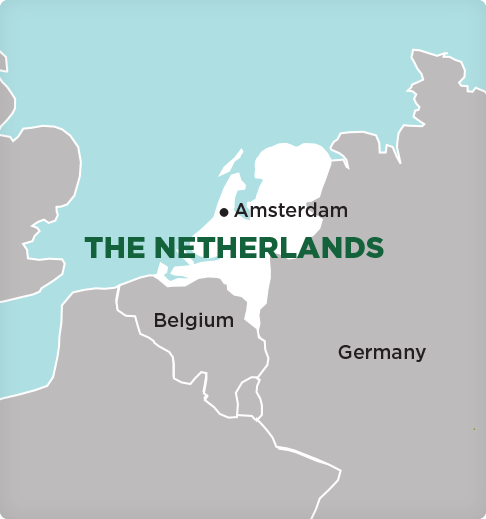Credits
6
Prerequisites
None
Courses taught in
English
Dates
Jun 16 – Jul 27
Program Countries
Netherlands
Program Base
Amsterdam
Critical Global Issue of Study
Identity & Human Resilience

Examine the broad and diverse areas of human trafficking—which occurs in a wide range of sectors—and the sex trade, including the relationship between sex workers and their broader societies.
6
None
English
Jun 16 – Jul 27
Netherlands
Amsterdam
Identity & Human Resilience
Examine the complex and multifaceted issues of human trafficking and sex trades. We consider human trafficking to be part of the backlash against decolonizing forces and the inevitable byproduct of late-stage, global capitalism. You will study the underlying historical events and theoretical worldviews that cast some people as chattel. You will also learn to think critically about the myriad types of sex work and the relationship between sex workers and their broader societies. Transactional sex, peep shows, camming, trans and queer phone banks, pornography, even the sale of sex toys can be considered sex work. While we look at multiple perspectives during the program, we acknowledge that sex workers are complex, multifaceted actors with agency who deserve respect. We can disagree on many issues, we will not infantilize, denigrate or in any way question the fundamental humanity of the people who take part in sex work.
None.


Visit Amsterdam’s famous Red Light District including a meet-and-greet at the information center and a tour with sex workers from the Prostitute Information Center of the Venus Temple and the Rijksmuseum, sex shops, pornography studios, and windows.
Travel to The Hague to visit the International Criminal Court, Humanity House, and several NGOs and IGOs who work with refugees.
Please note that SIT will make every effort to maintain its programs as described. To respond to emergent situations, however, SIT may have to change or cancel programs.
Upon successful completion of the program, students will be able to:
The following syllabi are representative of this program. Because courses develop and change over time to take advantage of dynamic learning opportunities, actual course content will vary from term to term.
The syllabi can be useful for students, faculty, and study abroad offices in assessing credit transfer. Read more about credit transfer.
Global Perspectives on Sex Work – syllabus
(GEND 3000 / 3 credits)
This course casts a critical eye on the myriad varieties of sex work and the relationship between sex workers and their broader society in the world. Although traditional, hetero “prostitution” – the exchange of intercourse for goods and/or services – comes first to mind, that is only the tip of the sex work iceberg. Transactional sex, peep shows, camming, trans and queer phone banks, pornography, even the sale of sex toys, can be considered sex work. This course explores these topics, among others.
The best study of sex work integrates the examination of the types of sex work with the ethos that supports it. We will examine deeply held theoretical and philosophical ideas about religion, gender, and sex that provide a structure for the way we approach sex work, and the current global political and economic systems that make sex work so profitable and popular.
Modern Human Trafficking – syllabus
(GEND 3500 / 3 credits)
This course not only considers what is happening in the world today, but also the underlying historical events and theoretical worldview that casts some people as chattel.
“…[T]he recruitment, transportation, transfer, harboring or receipt of persons, by means of the threat or use of force or other forms of coercion, of abduction, of fraud, of deception, of the abuse of power or of a position of vulnerability or of the giving or receiving of payments or benefits to achieve the consent of a person having control over another person, for the purpose of exploitation.”
This definition, from the United Nations Protocol to Prevent, Suppress, and Punish Trafficking in Humans, is the most widely cited definition of human trafficking. It is an attempt to craft an umbrella large enough to cover the wide variety of practices encompassed by the term “trafficking.” Early on, concern with human trafficking focused on women and children involved in the sex trade but more recent treatment also examines other avenues for the exploitation of women and children, as well as men. The World Health Organization notes that trafficking occurs in a wide range of sectors, including agriculture, fishing, manufacturing, mining, forestry, construction, domestic servitude, cleaning and hospitality services. Trafficked people may also be forced to work as beggars or soldiers, and women and children can be made to serve as “wives.”
This course examines the ancient phenomenon of human trafficking, and looks at trafficking as part of the backlash against decolonizing forces and the inevitable byproduct of late-stage, global capitalism.


Students on this program come from many different colleges, universities, and majors. Many have gone on to do work that connects back to their experience abroad with SIT. Positions recently held by alumni of this program include:
Associate director of college counseling and history at Mercersburg Academy
Birth doula at Birth Partners Doulas of Connecticut
Lead field organizer of the Alaska Democratic Party
Project member at Love Matters, RNW, Hilversum, Netherlands


SIT Study Abroad is committed to ensuring that international education is within reach for all students. We believe in the transformative power of immersive, intercultural experiences and are dedicated to supporting students in their educational journey.
See Full Breakdown
A critical step in preparing for your study abroad program is planning how you will maintain your health and wellbeing. Please review the following information carefully and contact [email protected] with any questions or concerns.
View Information